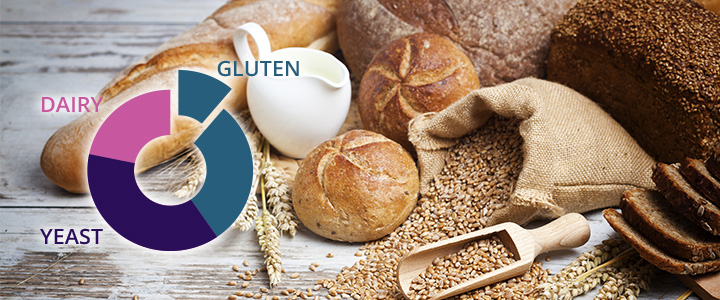Video Introduction to Food Intolerance Testing
Professional athletes are pretty healthy people, right? They have trainers, physiotherapists and nutritional advice on hand, all designed to make sure they perform at full capacity in their chosen sport.
With almost half of UK residents suffering from a food intolerance at some point in their lives, though, professional athletes are as vulnerable as anyone else.
After putting up with headaches, low energy levels and digestive problems for some time, former Rugby England Sevens captain Rob Vickerman recently decided to have intolerance testing. To his surprise, he found he reacted to cows’ milk, eggs and yeast, the very foods he relied upon to make up a protein-rich training diet. After swapping the offending foods for nutrient-rich alternatives, he found his problems eased and his performance increased accordingly. An even more high-profile case is that of champion tennis player Novak Djokovic, who says that following a gluten-free diet was a ‘real game changer’, and allowed him to reach his current winning form.
So what are food intolerances, and how will you know if you have one? Food intolerances are much less severe than food allergies, but are much more common. They can be triggered by a range of factors including a natural lack of the enzymes needed to break down certain foods or a particular sensitivity to histamines, salicylates (a natural preservative) or additives in food. Most affected people can eat a small amount of their ‘trigger food’ before getting symptoms, which usually include digestive problems like bloating and nausea and can include skin problems, fatigue, insomnia and much more.
The most common ‘trigger foods’ are gluten, dairy, eggs, alcohol and yeast. Foods rich in histamines such as chocolate, blue cheese, cured meat, fish, oranges and strawberries are also common culprits.
If you suffer from headaches, nausea, stomach problems like bloating or wind, skin problems, fatigue, asthma or sinusitis, your diet could be the cause. I recommend you start to keep a Food Diary, (I have designed a Food Diary for you to download.) Record what you eat and see how you feel afterwards – you might get a surprise when you’ve written down everything you eat in a normal day, especially when you find out what those foods may actually contain!
The good news is that at the Complete Health Clinic we now offer a simple blood test to help identify problem foods. To find out more, just get in touch on 0161 207 4034. It only takes a few minutes, and you could be well on your way to a healthier you in 2016.



